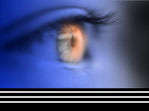|
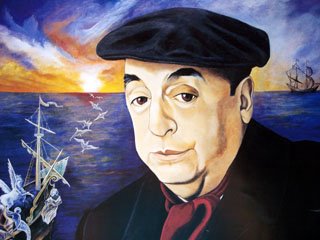
PAINTING
OF PABLO NERUDA AT ISLA NEGRA, CHILE
Anyway here is a bit of biographical info. on the world acclaimed
Chilean Poet, Pablo Neruda followed by one of his poems.
But first let me explain -The poem chosen for this post “ I’ll Explain Some Things ” is one in which Pablo
Neruda explains why some of his poems are political & speak about injustice oppression & brutality & torture & assassinations
& are filled with disturbing images about war & revolution about dying soldiers & civilians etc. This is a poem which
is suited to our time in which people in Canada & the United States & Britain prefer not to see the all too horrific images
of those who are detained & tortured & all those innocent civilians men women & children who are shot to death or blown
to pieces in Iraq or Palestine or Afghanistan in our troubling & disturbing policies in fighting Terrorism as once the
West fought against real or imaginary evil Communists around the Globe - then as now in our fight we have committed brutal
& unjustified attacks on various individuals groups & nations in our Zeal for revenge & blood for the 9/11 attacks &
other such attacks which has led to a world more dangerous & all our actions have only made matters worse .
All these crimes against humanity are done in our name & if you believe they are justified then you should be willing to contemplate
the end result of such policies which is not merely abstract but something quite tangible as flesh & bone are ripped to
pieces by bullets & the smell of burning human flesh as the military rains down Napalm on civilian populations & be willing
to ponder over the images of those whom we kill & linger over the images of the hundreds of thousands killed in our name to
protect Our HOMELAND as we deny others the right to protect their homes & neighborhoods from our invading forces .
Try to put yourself in the shoes of those who are arrested black-bagged taken to some prison to be tortured for days on end
& weeks & months & years - to not be charged with a crime- to be held incognito to be beaten for praying to your God &
someday released & told simply that it was just a mistake - a case of mistaken identity or some bureaucratic error - FOR
EXAMPLE CANADIAN CITIZEN MAHER ARAR !!! HOW MANY MORE HAVE BEEN FORGOTTEN ???
Most people in our society have lost the ability it seems to EMPATHIZE with others especially if they are different from them
in some way ie. color, race, language, culture or religion . Only our group actually feels all those others are incapable
of being sensitive or care about life as we do since they are all brutes mere animals in comparison to ourselves - this is
racism & Xenophobia at its worst .
It is not just those who commit these acts in our name & those who give the orders & set the policies but all who stand
by & do nothing are also guilty & so we all STAND ACCUSED . It is not just George Bush & his fanatical Neocons who
are guilty but all those politicians, bureaucrats & organizations & individual citizens who have stood back & did nothing
to stop the carnage & madness that has now engulfed Iraq & Afghanistan & Palestine & Lebanon & whatever countries
are next on our " HIT LIST " -
Unfortunately too many people in our society put far too much trust in our leaders & our Secret Police & the military
personnel who claim “ WE WERE JUST FOLLOWING ORDERS ”-
Pablo Neruda
From Wikipedia,
Neruda recording poems at the U.S. Library of Congress in 1966
Pablo Neruda (July 12, 1904 – September 23, 1973) was the pen name of the Chilean writer and communist politician Ricardo
Eliecer Neftalí Reyes Basoalto.
Having his works translated into dozens of languages, Pablo Neruda is considered one of the greatest and most influential
poets of the 20th century. Critic and biographer Alistar Reid has stated that Neruda is the most widely read poet since William
Shakespeare.
Neruda was accomplished in a wide variety of styles, ranging from erotically charged love poems, surrealist poems, historical
epics, and overtly political manifestos. Some of Neruda's most beloved poems are his "Odes to Common Things," collected in
several volumes. Colombian novelist Gabriel García Márquez has called him "the greatest poet of the 20th century in any language".
In 1971, Neruda was awarded the Nobel Prize for Literature after several years of being overlooked for his political activism.
During his lifetime, Neruda occupied many diplomatic posts and served a stint as senator for the Chilean Communist Party.
When Conservative Chilean President Videla outlawed communism in Chile, a warrant was issued for Neruda's arrest. Friends
hid him for months in a basement of a home in the Chilean port of Valparaiso. Neruda then escaped into exile through a mountain
pass into Argentina.
Years later, Neruda was a close collaborator to Socialist President Salvador Allende. Upon returning to Chile after his Nobel
Prize acceptance speech, Allende invited Neruda to read at the Chilean national soccer stadium before 70,000 people, the largest
poetry reading in recorded history.
Pablo Neruda, hospitalized with cancer at the time of the Chilean coup d'état led by Augusto Pinochet, died of heart failure
twelve days later. Already a legend in life, Neruda's death became charged with an intense symbolism that reverberated around
the world. Pinochet had denied permission to transform Neruda's funeral into a public event, but thousands of grieving Chileans
disobeyed the curfew, flooding the streets in tribute. Neruda's funeral became the first public protest against the Chilean
military dictatorship.
And from website:
Blues For Peace
And they shall beat their swords into Guitars...
http://www.bluesforpeace.com/
“ In 1933, Neruda published Residence on Earth which was a literary breakthrough. The two parts of Residence on Earth
contain his poetry from 1925 to 1935. They show Neruda at his most surrealistic. Neruda used obscure and violent imagery
to convey a sense of universal chaos.
The murder of Garcia Lorca, who Neruda knew, effected him strongly and he joined the republican movement in Spain. Because
of his political views, and the danger of civil-war torn Spain, he left in 1937 to return to Chile. In 1939, he was appointed
consul of Spanish emigration and moved to Paris and then Mexico. During this time he wrote Canto de Chile and Canto General
which was an epic about the South American continent. It was published in Mexico and underground in Chile. It was hard living
abroad and by 1943 he returned to Chile. In 1945 he was elected senator and joined the communist party. He protested President
Gonzales Videla’s oppressive policy against the striking miner’s union and had to live underground for two years
until he was able to leave in 1949. Returning to Europe he was only able to return in 1952. Because of these experiences,
he honed his message and published work closely related to his experiences. During this time he also won the Stalin prize
and Lenin Peace Prize. ”

PAINTING
" WAR " BY EILEEN AGAR RA (1899-1991) BRITISH SURREALIST
IMAGE Posted
by Picasa
“ Poetry is an act of peace. Peace goes into the making of a poet as flour goes into the making of bread.
Arsonists, warmongers, wolves hunt down the poet to burn, kill, sink their teeth into him. A swordsman left Pushkin mortally
wounded under the trees in a dark and gloomy park. The fiery horse of war charged over Petofi’s lifeless body. Byron
died in Greece , fighting against war. The Spanish Fascists started off the war in Spain by assassinating its greatest poet.
( Garcia Lorca )
But poetry has not died, it has a cat’s nine lives. They harass it, they drag it through the streets, they spit on it
and make it the butt of their jokes, they try to strangle it, drive it into exile, throw it into prison, pump lead into it,
and it survives every attempt with a clear face and a smile as bright as grains of rice. ”
PABLO NERUDA ( 1904-1973 )
from MEMOIRS
Translator Hardie St. Martin pub. 1977
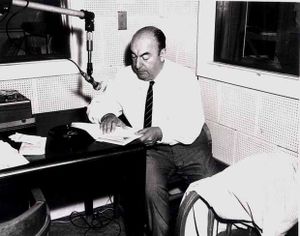
PABLO
NERUDA RECORDING POEMS AT U.S. LIBRARY OF CONGRESS
I'll Explain some Things
PABLO NERUDA
You’ll ask, Where are the lilacs?
And the philosophy dreamy with poppies?
And the rain which kept beating out
Your words, filling them
With water-specks and birds?
I’m going to tell you everything that happened to me.
I lived in a neighborhood
In Madrid with church bells
And clock towers and trees.
From there you could see
The dry face of Castille
Like a sea of leather
My house was called
“The house with the flowers” because around it
Geraniums exploded. It was
A beautiful house
With dogs and kids.
Raúl, do you remember?
Federico, do you still remember
Under the ground?
Do you remember my house with the balconies
Where the June light soaked your mouth with
The taste of flowers?
Brother! Brother!
The market place of Arguelles, my neighborhood
With its statue like a pale inkwell among
The fish stalls.
It was all
Loud voices, salty commerce,
A deep rumble
Of feet and hands filled the streets,
Meters and liters,
The sharp essence of life,
Fish stacked up,
The texture of roofs in the cold sun in which
The weather-vane grows tired.
Fine, crazily carved ivory of potatoes
Lines of tomatoes to the sea.
Then one morning flames
Came out of the ground
Devouring human beings.
From then on fire,
Gunpowder from then on,
From then on blood.
Bandits with airplanes and Moorish troops
Bandits with gold rings and duchesses
Bandits with black monks giving their blessing
Came across the sky to kill children
And through the streets, the blood of children
Ran simply, like children’s blood does.
Jackals that a jackal would reject
Stones that a dry thistle would bite and spit out
Vipers that vipers would hate!
I have seen the blood
Of Spain rise up against you
To drown you in a single wave
Of pride and knives!
Generals
Traitors
Look at my dead home
Look at broken Spain –
But from each dead house
Burning metal shoots out
Instead of flowers.
From every shell-hole in Spain
Spain will rise.
From every dead child a rifle with
Eyes will rise.
From every crime bullets will be born
Which will one day find a place
In your hearts.
You ask “Why doesn’t your poetry
Speak to us of dreams and leaves
Of the great volcanoes of your native land?”
Come
See the blood along the streets
Come see
The blood along the streets
Come see the blood
Along the Streets!
Pablo Neruda
Ode to the Book
translated by Nathaniel Tarn
When I close a book
I open life.
I hear
faltering cries
among harbours.
Copper ignots
slide down sand-pits
to Tocopilla.
Night time.
Among the islands
our ocean
throbs with fish,
touches the feet, the thighs,
the chalk ribs
of my country.
The whole of night
clings to its shores, by dawn
it wakes up singing
as if it had excited a guitar.
The ocean's surge is calling.
The wind
calls me
and Rodriguez calls,
and Jose Antonio--
I got a telegram
from the "Mine" Union
and the one I love
(whose name I won't let out)
expects me in Bucalemu.
No book has been able
to wrap me in paper,
to fill me up
with typography,
with heavenly imprints
or was ever able
to bind my eyes,
I come out of books to people orchards
with the hoarse family of my song,
to work the burning metals
or to eat smoked beef
by mountain firesides.
I love adventurous
books,
books of forest or snow,
depth or sky
but hate
the spider book
in which thought
has laid poisonous wires
to trap the juvenile
and circling fly.
Book, let me go.
I won't go clothed
in volumes,
I don't come out
of collected works,
my poems
have not eaten poems--
they devour
exciting happenings,
feed on rough weather,
and dig their food
out of earth and men.
I'm on my way
with dust in my shoes
free of mythology:
send books back to their shelves,
I'm going down into the streets.
I learned about life
from life itself,
love I learned in a single kiss
and could teach no one anything
except that I have lived
with something in common among men,
when fighting with them,
when saying all their say in my song.
Here are some websites to check out for more on Pablo Neruda
Pablo Neruda at Culture Cafe: Lone Star Internet
Poet Seers
Pablo Neruda Nobel Prize in Literature 1971 Bio
Pablo Neruda Wikipedia
Pablo Neruda at PoemHunter.com
Pablo Neruda Page
For more current injustices see below:
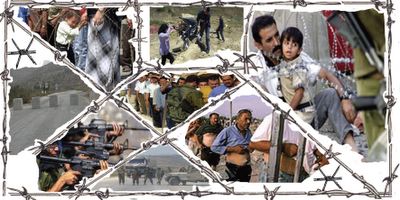
PALESTINIANS
UNDER SEIGE BY ISRAELIS WHILE THE WEST REMAINS SILENT-
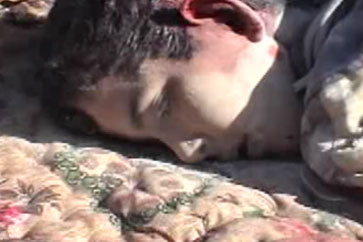
DEAD CHILD
IN IRAQ - DEATH TOLL IN IRAQ 450,000-655,000 - THE BLOOD ON OUR HANDS
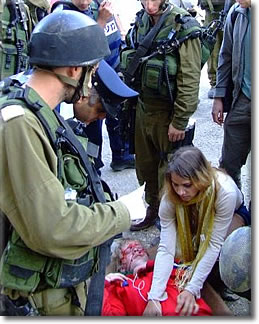
SWEDISH
VOLUNTEER ATTACKED BY ISRAELI EXTREMISTS WHILE ISRAELI SOLDIERS STOOD IDLY BY - THIS IS JUSTICE ISRAELI STYLE A SOCIETY WITHOUT
SHAME
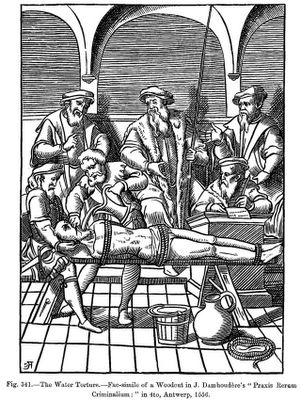
WATER
TORTURE THEN & NOW TORQUEMADA TO BUSH BLAIR & OUR OWN NEOCON HARPER - WHILE THE PUBLIC CHEERS
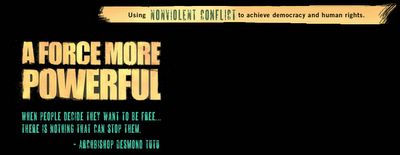
HOMECONTENTBG.ORG
- IS THERE ANOTHER WAY ???
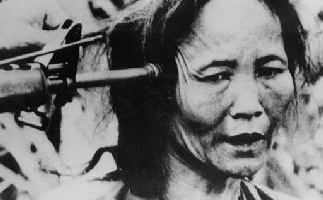
MY
LAI SPREADING DEMOCRACY THE AMERICAN & THE WESTERN WAY
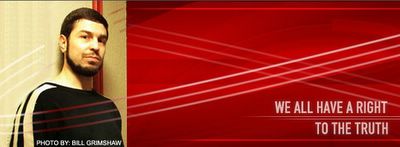
Maher Arar is a 34-year-old wireless technology consultant.
He was born in Syria and came to Canada with his family at the age of 17. He became a Canadian citizen in 1991. On Sept. 26,
2002, while in transit in New York s JFK airport when returning home from a vacation, Arar was detained by US officials and
interrogated about alleged links to al-Qaeda. Twelve days later, he was chained, shackled and flown to Syria, where he was
held in a tiny grave-like cell for ten months and ten days before he was moved to a better cell in a different prison. In
Syria, he was beaten, tortured and forced to make a false confession.
During his imprisonment, Arar's wife, Monia Mazigh, campaigned
relentlessly on his behalf until he was returned to Canada in October 2003. On Jan. 28, 2004, under pressure from Canadian
human rights organizations and a growing number of citizens, the Government of Canada announced a Commission of Inquiry into
the Actions of Canadian Officials in Relation to MAHER ARAR .
|
